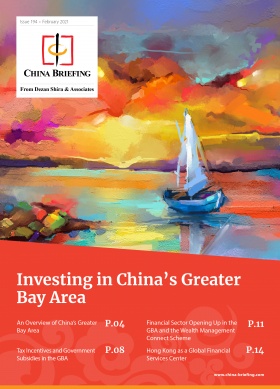China Hints at Launching Shanghai-Zurich Stock Connect Program
The Shanghai Stock Exchange (SSE) may inaugurate the sale of global depositary receipts (GDRs) in Switzerland by Chinese companies in 2021, along the lines of the Shanghai-London Stock Connect. This intention was picked up during a recent speech made by a senior SSE official.
On April 20, 2020, Cai Jianchun, general manager of the SSE, said in a panel discussion at the Boao Forum in Hainan, “We are preparing to make important efforts in Switzerland going forward and we believe that the first batch of the trial will succeed this year”.
Cai did not provide more details on his statement. But it was viewed by the media as a hint of “another move to diversify China’s financing resources and a deepening tie of the two countries”. In 2019, China and Switzerland agreed to study the feasibility of listing securities like GDRs on each other’s markets.
If this really happens, it will become the SSE’s third ‘Stock Connect’ after the Shanghai-Hong Kong Stock Connect and the Shanghai-London Stock Connect.
What is GDR?
A global deposit receipt or GDR is a kind of depositary receipt under which shares are listed in one or more markets, most frequently, the US market and the European markets.
The depositary receipts themselves are a kind of financial instrument to avoid trading and legal barriers in direct listings and to facilitate investors. For example, if a Chinese company issues shares abroad to raise funds, it entrusts a certain number of shares to an intermediary institution (usually a bank), and the depositary bank notifies the local depositary bank (equivalent to a salesman) of the foreign country to issue depositary receipts representing the shares. Investors can buy and sell these shares directly through intermediaries.
From the investor’s point of view, depositary receipts are transferable stock certificates issued by depositary banks, which prove that investors have a certain number of shares of a foreign company only in custody. The holder of the voucher is actually the owner of the stock deposited and is the same as the original stockholder.
GDRs are most commonly used when the issuer is raising capital in the local market as well as in the international and US markets. The main advantage of issuing GDR is that the company’s shares can reach a broader and more diverse scope of potential investors. Besides, by listing on major global exchanges, the company can look more legitimate to investors in foreign markets who are unfamiliar with the company. For investors, it provides an easy way to diversify their investment portfolio without having to open up foreign brokerage accounts and deal with multiple exchange rates. Depositary receipts are thus more convenient and less expensive than purchasing stocks in foreign markets. This can increase the accessibility of a country’s financial products to investors from other countries.
Why has China been launching stock connects?
The launch of the Stock Connects is an important step in advancing China’s financial opening up and accelerating the internationalization of China’s capital market.
Opening up is a fundamental state policy established in the process of China’s development. A closed financial system cannot sustain China’s long-term economic growth.
To be more specific, the Stock Connects are of significance to China’s economy and financial market in the below aspects:
- First, it is conducive to expanding the two-way opening of China’s capital market, improving the depth and internationalization of the domestic market, promoting domestic securities institutions to carry out cross-border securities business, and enhancing the international competitiveness of the securities industry.
- Second, it provides convenient opportunities for issuers and investors of the two places to enter each other’s market for investment and financing, enables domestic residents to invest in overseas products in the local market, supports A-share listed companies to integrate funds into the overseas market, and support cross-border financing and mergers and acquisitions in the real economy.
- Third, it is conducive to promoting the construction of Shanghai as an international financial center, with the SSE to become a bourse of enhanced internationalization.
China’s existing stock connects
Shanghai-Hong Kong Stock Connect and Shenzhen-Hong Kong Stock Connect
The Shanghai-Hong Kong Stock Connect and Shenzhen-Hong Kong Stock Connect are cross-border investment channels that connect the Hong Kong Stock Exchange with the mainland market. Under the program, investors in each market are able to trade shares on the other market using their local brokers and clearinghouses. The Shanghai-Hong Kong Stock Connect was officially launched on November 17, 2014, and the Shenzhen-Hong Kong Stock Connect was officially launched on December 5, 2016. Both channels use the RMB for transactions.
After the smooth implementation of the Shanghai-Hong Kong stock connect and Shenzhen-Hong Kong stock connect, the internationalization level of the mainland stock market has been greatly improved, and nearly RMB 2 trillion (US$308 billion) of mainland capital has been brought to the Hong Kong market, according to Cai’s speech at the Boao Forum this year. Hypothetically, if we regarded the Shanghai/Shenzhen/Hong Kong Stock Connect as a single independent exchange, its trading volume in the first quarter of 2021 would rank seventh among the global exchanges.
Shanghai-London Stock Connect
The Shanghai-London Stock Connect was launched on June 17, 2019, at the London Stock Exchange (LSE) to facilitate a new level of capital cooperation between China and the UK, two of the world’s largest economies. Under the Shanghai-London Stock Connect, qualified companies satisfying the listing qualifications in both markets may issue depositary receipts and list and trade on the other markets.
Political tension between the two countries came to a head in 2019 due to the British government’s response to anti-government protests in Hong Kong, leading to rumors that the Stock Connect program had been halted. However, despite rumors that the Shanghai-London Stock Connect was suspended, the China Securities Regulatory Commission affirmed that the Connect was in fact operating normally since its inception.
Huatai Securities, a China-based brokerage firm, has been the first group to successfully list when it raised US$1.5 billion selling depository receipts on the London Stock Exchange in June 2019.
China Pacific, the fourth-largest insurance company in China by revenue, issued US$1.8 billion in GDRs in London in June 2020, making it London’s second-largest stock listing of the year.
About Us
China Briefing is written and produced by Dezan Shira & Associates. The practice assists foreign investors into China and has done so since 1992 through offices in Beijing, Tianjin, Dalian, Qingdao, Shanghai, Hangzhou, Ningbo, Suzhou, Guangzhou, Dongguan, Zhongshan, Shenzhen, and Hong Kong. Please contact the firm for assistance in China at china@dezshira.com.
Dezan Shira & Associates has offices in Vietnam, Indonesia, Singapore, United States, Germany, Italy, India, and Russia, in addition to our trade research facilities along the Belt & Road Initiative. We also have partner firms assisting foreign investors in The Philippines, Malaysia, Thailand, Bangladesh.
- Previous Article Belt and Road Weekly Investor Intelligence, #26
- Next Article Investing in Inland China: Chongqing, Gateway to China’s West






